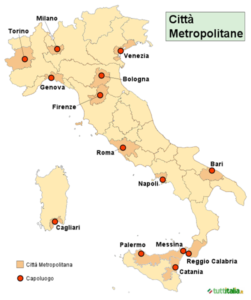As the main redistributive policy of the European Union – amounting to roughly one third of the EU 7-year budget – cohesion policy offers considerable resources to tackle imbalances among European regions. The need to manage such an amount of public funds in an effective and accountable inevitably brings about specific requirements for evaluation. These are set by the European Commission in the Common Provisions Regulation, the main legislation on cohesion funds, as well as in other specific acts.

© Efired – Shutterstock
Overall, funds are implemented through Operational Programmes: within each Programme, a Managing Authority and a monitoring committee oversee the planning and implementation of evaluation activities. The latter can take place before, during and after the financing process, and involve a wide set of private and public actors.
EU projects implemented on the Italian territory form part of Regional Programmes, cross-border, transnational, interregional ones (Interreg), or National Operational Programmes. Traditionally, the latter have been developed following a thematic logic: this is the case of the PON ‘Città Metropolitane’ (PON Metro), a programme counting on both the European Social Fund and European Regional Development Fund to respond to several needs of Italian major urban areas, from digitalisation to public transport and housing. This blog post, based upon the author’s master’s thesis research, describes evaluation activities and their multi-level nature within the PON Metro.

Figure 1 – Map of Italian Metropolitan Cities. Source
A variety of actors at several levels of governance
The Managing Authority of the Programme is the Italian Agency for Territorial Cohesion, attached to the Cabinet of the Prime Minister. It is the ‘face and mind’ of the PON Metro, tasked with the selection and coordination of activities, including evaluation. The Agency also covers the role of Certifying Authority, in charge of accounting activities. In doing so, it must consider all documents produced by the Audit Authority, which is represented by a branch of the Ministry of Economy and Finance.
In addition, a Monitoring Committee gathers once a year to overlook the smooth running of the Programme: it includes the Managing Authority, representatives of the national government, of metropolitan cities, and of the Ministries in charge of synergetic EU-funded programmes, as well as external evaluators. Such meetings constitute a key opportunity to report on and discuss the results of the evaluations carried out throughout the previous months.
Urban authorities also play a role: they distribute resources and activities throughout the different cities in the programming phase and follow their concrete implementation by selecting the target audience and the entities – public, private, or non-profit – in charge of carrying them out. Each of them can thus be considered as a “mini-managing authority” and has the power to launch autonomous evaluation activities if necessary.
Finally, private or non-profit actors are involved in the implementation and evaluation of projects. External consultants can carry out independent reports by answering calls for tenders, as it has been the case of some documents produced so far within the PON Metro.
Plans, documents, types of evaluation
An ex-ante evaluation report is sent by Managing Authorities alongside each proposed Operational Programme. In the case of the PON Metro, it measures the expected output of the projects and highlights strengths, weaknesses, and complementarities of each foreseen measures, as well as their internal coherence.
An Evaluation Plan was also approved, outlining all aspects of the organisation of in itinere evaluations within the Programme: the activities foreseen and respective budget, their management and concrete implementation. Activities include surveys and analyses, implementation evaluations, and impact evaluations. Officials involved in the drafting of the Plan have reported on the challenges in finding relevant indicators for the Plan, considering the novelty of the Programme and the necessity to adapt data collection to its very specific territorial and sectoral scope.
Finally, yearly Implementation Reports are submitted to the Commission, including relevant information such as financial data, indicators, and targets. They are among the objects of discussion of each Monitoring Committee meeting, along with other documents drafted by external evaluators. For the PON Metro, the latter have largely covered activities relating Axis 3 ‘Social Inclusion’. They are drafted by a consortium headed by the non-profit Istituto per la Ricerca Sociale.
The peculiar nature of the PON Metro
Evaluation requirements from the European Commission have increased throughout the years and the programming periods. Despite a certain diversity across countries and Programmes, three features remain constant: the involvement of the European Commission, the coordination role of Managing Authorities, and the possibility to resort to the expertise of external evaluators. The case of the PON Metro constitutes an interesting case study: on the one hand, the very nature of a national Programme targeting urban areas using European Funds makes its governance inevitably multi-level. On the other hand, innovative evaluation devices were put in place to ensure constant monitoring and accountability of this recently launched Programme.

Beniamino Brunati (LinkedIn) obtained his Master’s degree at the Institute for European Studies in Brussels in 2021, with a thesis on the evaluation of EU cohesion policy in Italy. He is now specializing in regional and urban development, with a focus on EU cross-border cooperation and the blue economy.
Are you currently involved with regional research, policy, and development? The Regional Studies Association is accepting articles for their online blog. For more information, contact the Blog Editor at rsablog@regionalstudies.org.